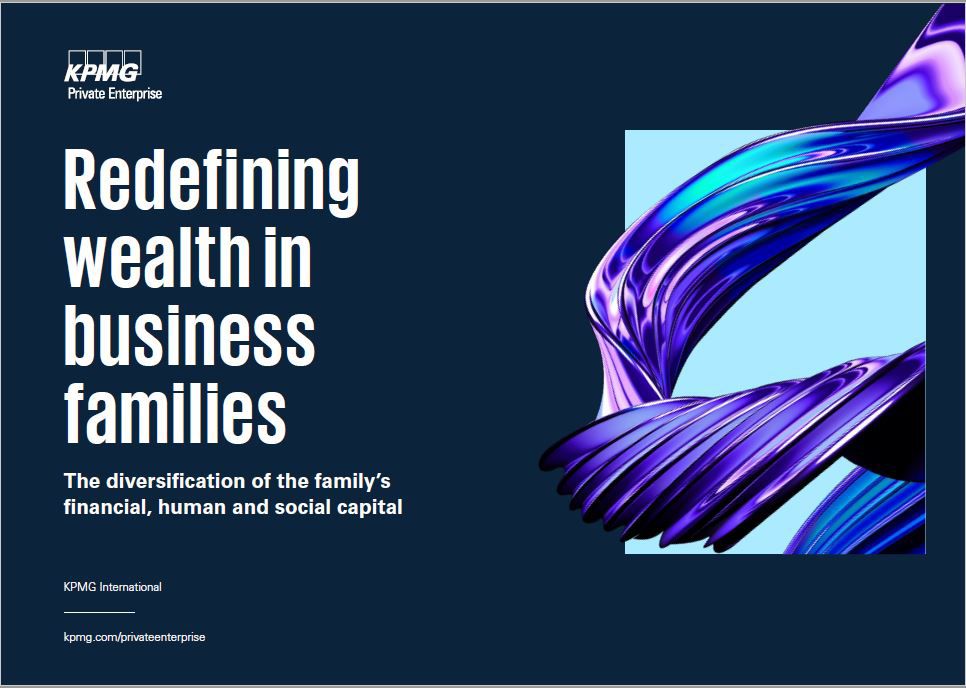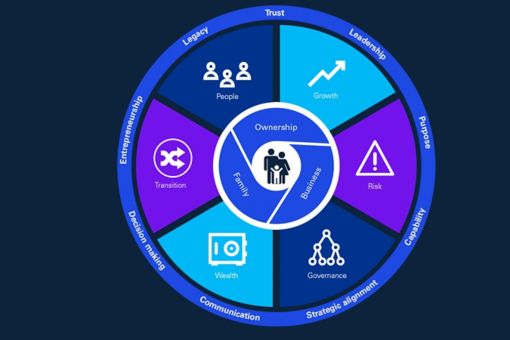Many business families are facing a new reality in terms of how they create wealth and allocate their capital. After a lifetime of having the family’s wealth almost entirely bound up in their business, business families are recognizing that they need to de-risk and diversify their wealth in today’s more volatile and unpredictable environment.
Business families are facing a new wealth creation and capital allocation reality.
How might families and their businesses define their future wealth?
A new era of asset allocation
The concept of capital and how it is allocated in family businesses is evolving. It not only includes the tangible assets of the business, but the family’s human and social capital as well.
Protecting financial capital
With the recent economic headwinds, financial capital strategies are being driven by the need to de-risk the family’s wealth.
Growing human capital
Transferring the knowledge and experience of current generations and encouraging the innovations of next-generation family members are vital for maintaining and growing the family’s human capital.
Recognizing the power of social capital assets
Family-owned companies understand that they often have a strong public presence and an important social responsibility, making the careful management of their social capital assets a reputational and competitive priority.
When we look back at previous generations, it could be argued that the primary focus of many family businesses was generally on creating wealth for wealth’s sake. But current next-generation family members are changing that, and they’re dialing up the human and social elements. It’s still about creating wealth, but now more questions are being asked about, ‘how can we use this wealth to improve society?’ and less about 'what we can do to just keep building it'.
Tom McGinness
Global Leader, Family Business, KPMG Private Enterprise
KPMG International, and Partner, KPMG in the UK
Building and passing on multi-generational wealth
Current family business leaders are increasingly recognizing and accepting that not all upcoming generations of their family will necessarily have an interest in being directly involved in the legacy business. Many next-generation family members are seeking ways to create their own independent wealth – and, in some business families, this is being viewed as a new strategic financial diversification opportunity.
Families are prioritizing funding new ideas and ventures of the next generation, which assist with the diversification strategy.
Leveraging human capital
The family itself, and its purpose and values, is one of the largest and most influential human capital assets. It represents the socioemotional wealth that is associated with being part of a family in business. And continuing to build and leverage the family’s intellectual capital contributes directly to the preservation of the family’s entrepreneurial spirit and the founder’s legacy.
As Millennial and GenZ family members enter the workforce, it’s possible that the family business may not always be their right fit. However, it is still possible and important to pass along the entrepreneurial spirit of the family to each successive generation, without necessarily transferring the control and management of the business.
It isn’t necessary to “handcuff” family members to the business. It’s important to tap into everyone’s insights, but forcing family members into the business is a recipe for disappointment. It definitely isn’t a good way to make sure the business and the family are able to keep growing.
Luiz Gustavo Kass Mwosa
CEO, Grupo Paranoá,
Brazil
Brand and reputation – powerful social capital assets
Large, publicly prominent family businesses have always taken great care to maintain a positive profile with all their key stakeholders, including relevant tax authorities. As good corporate citizens, business families would never take advantage of opportunistic tax opportunities if their actions could be construed as inappropriate or questionable in the eyes of their customers, employees or community members. They aren’t willing to risk the impact that such actions may have on their reputation and the potential damage to the trust in their brand if people began to view their family and company in a different — and potentially negative — light.
As good corporate citizens, family businesses have an opportunity to achieve an above-average rate of return on all their long-term investments by reviewing how they allocate their financial, human and social capital.
We see ESG, as a practical concept, as reputational. ESG as presently presented by some companies is mere “greenwashing.” ESG to be functionally valuable needs rigorous and fact-based metrics and standards. We don’t just think about doing the right thing, but what is also the admirable and thoughtful thing to do. We also want to measure and hold ourselves accountable for doing better by talking openly about it and its true targets with our employees, and in having everyone in management, the board and ownership focused on doing what’s right for our stakeholders from owners to our communities. At the end of the day, we can afford to lose money in our company, but we can never afford to lose a shred of our reputation.
Ed Weisiger
President and CEO, Carolina Tractor & Equipment Co.
United States
Will the next generation of families in business redefine the meaning of wealth?
Even though not all family members will want to work in the family business, it doesn’t mean that family members who are not in the business will disengage from the business. The family is the glue that binds, and family members will continue to care about what matters most to the family and measure their wealth in that way. This includes the legacy they have inherited, and the need to allocate all of their available financial, human and social capital carefully to deliver value to the family as well as its customers, employees, communities and society at large.
This article is part of a series from KPMG Private Enterprise exploring how family businesses are adopting new ways of thinking and driving innovations that are preparing their businesses and their families for future opportunities. The articles provide practical examples of how family businesses are keeping their minds open and turning emerging trends into the drivers of their future growth and success.
The first article ‘Sustaining a culture of continuous transformation in family business’ focuses on the broad topic of business transformation and shares insights from family business leaders on their approach to business transformation, and how it sustains their purpose, values and the long-term success of their businesses. The second in the series, “Good for business, good for the world”, shares insights and guidance from family business leaders globally who are taking new steps to progress their companies’ social and environmental agendas.
The views and opinions of external contributors expressed herein are those of the interviewees and do not necessarily represent the views and opinions of KPMG International Limited or any KPMG member firm.
KPMG’s participation and contribution in this regard is not an endorsement, sponsorship or implied backing of any company’s products or services.
Key contacts
Connect with us
- Find office locations kpmg.findOfficeLocations
- kpmg.emailUs
- Social media @ KPMG kpmg.socialMedia






